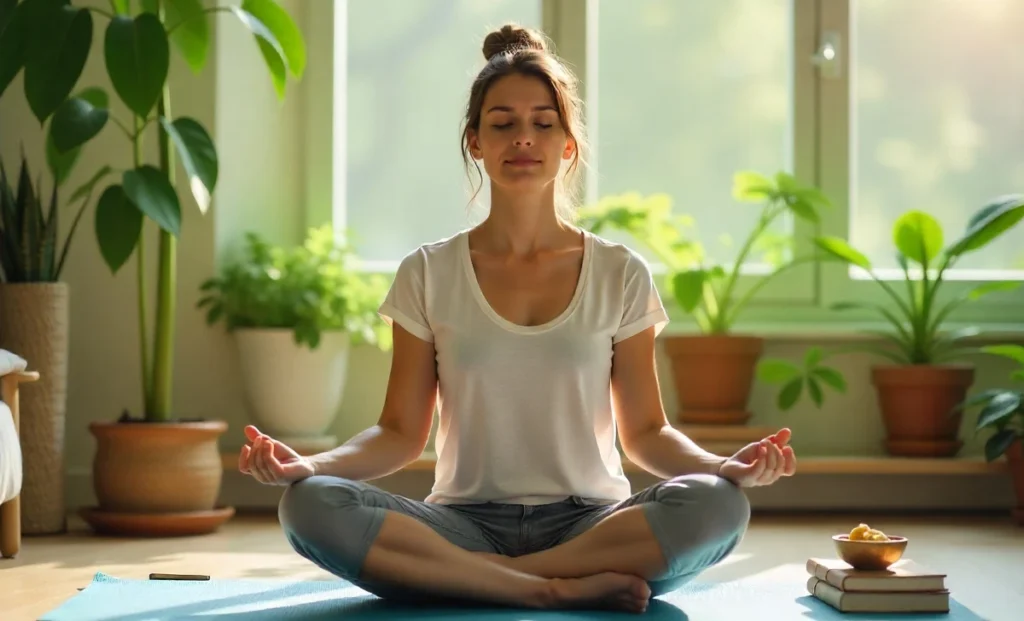Learning how to manage stress lifestyle starts with recognizing that stress doesn’t have to control your daily routine.
I used to think stress was just part of being an adult.
Work deadlines, family responsibilities, and endless to-do lists felt overwhelming.
Then I realized something important: stress management isn’t about eliminating stress completely.
It’s about building habits that help you respond better when life gets chaotic.
Understanding the Connection Between Stress and Your Overall Health
Stress affects your body in ways you might not realize.
When I’m stressed, I notice my shoulders tense up, my sleep gets disrupted, and I reach for unhealthy snacks.
This isn’t just in my head – stress triggers real physical responses.
Your body releases cortisol, which can impact everything from your immune system to your digestion.
Mental health and stress go hand in hand too.
Chronic stress can lead to anxiety, depression, and difficulty concentrating on daily tasks.
The Power of Mindfulness in Daily Stress Management
Mindfulness became my game-changer for managing everyday stress.
I started with just five minutes of meditation each morning.
Nothing fancy – just sitting quietly and focusing on my breathing while sipping my coffee.
The key is consistency, not perfection.
Some days my mind races with thoughts about work meetings and grocery lists.
That’s totally normal, and I’ve learned to gently redirect my attention back to the present moment.
Simple Mindfulness Techniques You Can Try Today
Deep breathing exercises work anywhere – at your desk, in traffic, or before important meetings.
I use the 4-7-8 technique: breathe in for 4 counts, hold for 7, exhale for 8.
Body scan meditation helps me notice where I’m holding tension throughout the day.
Mindful eating turns meals into stress-relief moments instead of rushed fuel stops.
Exercise: Your Natural Stress-Fighting Ally
Moving your body is one of the best ways to manage stress naturally.
I don’t mean you need to become a fitness guru overnight.
Even a 15-minute walk around the block can shift your mental state completely.
Exercise releases endorphins, which are your body’s natural mood boosters and stress fighters.
Regular physical activity also improves sleep quality and increases your energy levels throughout the day.
Finding Movement That Works for Your Lifestyle
Walking is my go-to stress reliever because it requires no special equipment or gym membership.
Yoga combines movement with mindfulness, giving you double the stress-fighting benefits in one session.
Dancing to your favorite music can instantly lift your mood and release built-up tension.
Gardening connects you with nature while providing gentle physical activity and a sense of accomplishment.
The best exercise is the one you’ll actually do consistently.
Nourishing Your Body to Support Stress Management
What you eat directly impacts how you handle stress.
I used to grab whatever was convenient when stressed – usually sugary snacks or caffeine.
This created energy crashes that made my stress worse.
Healthy eating doesn’t mean strict diets or giving up foods you enjoy.
It means choosing foods that give you steady energy and support your mental clarity.
Stress-Fighting Foods to Include in Your Diet
Complex carbohydrates like oatmeal and whole grains help stabilize your blood sugar and mood.
Omega-3 rich foods such as salmon, walnuts, and chia seeds support brain health and reduce inflammation.
Leafy greens provide magnesium, which helps your nervous system manage stress more effectively.
Herbal teas like chamomile or passionflower can naturally calm your mind before bedtime.
Dark chocolate contains compounds that can actually reduce stress hormones when enjoyed in moderation.
The Critical Role of Quality Sleep in Stress Management
Poor sleep and stress create a vicious cycle that’s hard to break.
When I’m stressed, my mind races at bedtime, making it harder to fall asleep.
Then lack of sleep makes me more reactive to stressful situations the next day.
Sleep hygiene became essential for breaking this pattern.
Creating Your Stress-Reducing Sleep Routine
I start winding down an hour before my target bedtime.
Digital detox means putting away phones, tablets, and laptops to let my brain transition to rest mode.
My bedroom stays cool, dark, and quiet – like a sanctuary designed specifically for recovery.
Consistent sleep and wake times help regulate my body’s natural rhythm, even on weekends.
A warm bath or gentle stretching signals to my body that it’s time to relax and prepare for sleep.
Time Management: The Foundation of Stress-Free Living
Time management isn’t about squeezing more tasks into your day.
It’s about making intentional choices about how you spend your energy and attention.
I learned to distinguish between urgent tasks and important ones.
Prioritization helps me focus on what truly matters instead of feeling scattered across multiple responsibilities.
Practical Time Management Strategies
Time blocking means dedicating specific hours to specific activities, reducing decision fatigue throughout the day.
The two-minute rule says if something takes less than two minutes, do it immediately rather than adding it to your growing to-do list.
Saying no protects your time and energy for commitments that align with your values and goals.
Batch processing similar tasks together increases efficiency and reduces the mental energy needed for constant task-switching.
The Healing Power of Journaling and Self-Reflection
Journaling helps me process emotions and gain perspective on stressful situations.
I don’t write novels – sometimes just a few sentences about my day or current challenges.
This practice helps me identify patterns in my stress triggers and responses.
Self-reflection through writing often reveals solutions I couldn’t see when thoughts were swirling in my head.
Different Journaling Approaches to Try
Gratitude journaling shifts your focus toward positive aspects of your life, even during challenging times.
Stream-of-consciousness writing allows you to dump worries onto paper, clearing mental space for problem-solving.
Stress tracking helps you identify specific triggers and develop targeted coping strategies over time.
Digital Detox: Reclaiming Your Mental Space
Our devices can be major stress contributors without us realizing it.
Constant notifications, social media comparisons, and information overload create background anxiety.
Digital boundaries have become essential for my mental wellbeing and stress management.
I turn off non-essential notifications and designate phone-free zones in my home.
Creating Healthy Technology Habits
Morning routines without immediately checking your phone set a calmer tone for the entire day.
Evening cutoffs for screens help your brain transition into rest mode more naturally.
Social media breaks reduce comparison stress and free up time for real-world activities and relationships.
News consumption limits help you stay informed without becoming overwhelmed by constant negative headlines.
Building Long-Term Balance: Small Habits, Big Results
Sustainable stress management comes from small, consistent changes rather than dramatic lifestyle overhauls.
I focus on adding one new healthy habit at a time to manage stress lifestyle effectively over the long term.
This approach feels manageable and creates lasting change without overwhelming my already busy schedule.
Making sustainable changes to your daily routine is key to long-term stress management success.
Progress over perfection keeps me motivated when life inevitably gets chaotic again.
The habits that stick are the ones that feel natural and enjoyable, not like additional stressors in your routine.
Conclusion
Managing stress through lifestyle changes doesn’t require a complete life transformation.
Start with one or two strategies that resonate with you most.
Maybe it’s a five-minute morning meditation or a evening walk around your neighborhood.
Small, consistent actions build the foundation for long-term stress resilience and overall wellbeing.
Remember, learning how to manage stress lifestyle is a journey, not a destination you reach once and forget about.
Frequently Asked Questions
How long does it take to see results from stress management techniques?
Some techniques like deep breathing provide immediate relief, while others like regular exercise show benefits within 2-3 weeks of consistent practice.
Can I manage stress without medication?
Many people successfully manage stress through lifestyle changes, but severe chronic stress may require professional support. Consult healthcare providers for personalized guidance.
What’s the most effective stress management technique?
The most effective technique is the one you’ll use consistently. Experiment with different approaches to find what works best for your personality and schedule.
How do I stick to stress management habits when I’m already overwhelmed?
Start with micro-habits that take less than 5 minutes. Focus on consistency over intensity, and remember that even small actions contribute to stress reduction.
Is it normal for stress management to feel difficult at first?
Yes, building new habits requires mental energy initially. Start small, be patient with yourself, and remember that practice makes these techniques feel more natural over time.







